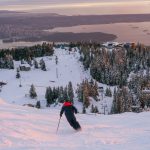Eagles in Stanley Park: SPES Surveys Stanley Park’s Top Predator
This month’s guest post is contributed by Jess Causby, Communications Volunteer with the Stanley Park Ecology Society (“SPES”)
Bald Eagles, one of Stanley Park’s top predators, are coming up to their most crucial time of year. Throughout this month, the eagles will be laying their eggs.

First Sighting
During the first week of March, I had the chance to head out with Stanley Park Ecology Society’s Conservation Technician, Meghan Cooling, to survey eagles’ nests in Stanley Park. There may still be snow patches on the ground, but these big birds are sticking to their breeding schedule.

We first visited the largest nest in the Park; the eagle pair has been nesting there since before SPES began its surveys in 2004. Years of nest building have created a deep nest, making it quite difficult to see into. But, I was lucky enough to spot a white head sticking out of the top – my first nesting eagle sighting.
According to Meghan, this nest is the most consistently successful at producing eaglets. She explains that this is potentially because the eagle couple is older and therefore more experienced.
Meghan then took me to a second nest, which seems even larger and can only be seen from the base of the tree. Unfortunately there were no eagles there this time, but I’ll definitely be back to help with another survey to try and spot some more!
The Survey

The eagle survey is one of SPES’s longest running wildlife surveys. Meghan and volunteers conducts the survey each week; they observe each nest and record the visit date and time and the number of adults and/or chicks seen. This helps to keep track of the number of nesting eagles to note any changes in the population.
Throughout March, SPES is surveying twice a week in order to get a precise idea of when the eagles start incubating eggs and to estimate when the eggs are going to hatch. Volunteers are helping to complete this survey, so if this is something you would like to be involved in, please contact the SPES Volunteer Coordinator at: [email protected].
The Nests
There are four main ‘territories’ where eagles are located across Stanley Park and four active nests currently under observation. Some couples do have alternate nests, as eagles tend to build nests across multiple spots. Meghan suggests this may be due to nest disturbances, which SPES has seen happen to nests in previous years.
Out of the four active nests in the Park, two of these were successful last year, producing three eaglets between them.
The nests are usually found near the water, close to their prey which consists of a range of fish and birds such as ducks and seagulls. Spawning salmon is also on the menu. Eagles drag the salmon out from the water and often displace the salmon carcasses into the forests; this has turned out to be an incredibly important source of nutrients for forest ecosystems. Stanley Park no longer supports salmon bearing streams so the Park’s eagles head to Squamish and other salmon spawning hotspots from mid-November to January.
Hooking Up

One of the Park’s eagle couples lays its eggs a lot earlier than the others (around March 1st), but typically eagles tend to do this a few weeks into March – so SPES will be seeing some action pretty soon! Interestingly, a given eagle couple tends to lay their eggs on almost the same date every year!
After hatching, it takes around 8 weeks until the eaglets are ready to leave the nest. The eaglets have lots of baby fat on their bodies, which needs to be lost before their first flight. To encourage them to leave the nest, adults stop bringing the eaglets food. Adult eagles have even been seen to fly by the nest with food, in order to try and temp the fledglings out.
Fun Facts About Eagles
- Eagles add to their nests each year and make the biggest nests of any bird in North America.
- There are around 20,000 bald eagles in BC (over a third of their total population).
- Eagles have a white head and tail, whereas juveniles have white patches through their body.
- From the day the eagles lay their eggs, it is around 35 days until the eggs hatch.
- Females are approximately 25% bigger than males.
Where Can I See Eagles?
Although there are only eight eagles nesting in the Park in total, there are many vagrant eagles passing through. Last week, the SPES Conservation team spotted 18 eagles flying over the Stanley Park Pavilion, so get out there with your binoculars and take a look!
Along the Seawall of the Park is the best place to try and spot eagles, particularly between Second Beach and Slhx̱i7lsh (Siwash Rock). They can often be spotted in some of the large trees overlooking the ocean.
Many of the Park’s eagles also spend a lot of their time up in Squamish. The average number of recorded eagles in Squamish is approximately 1300 per year. Brackendale, just north of Squamish town centre, is a great place to view them!
To get involved or see SPES event listings, including a monthly bird walk, please visit the events page on the SPES website here.
About SPES Saturday
As a member of the Stanley Park Ecology Society, I wanted to offer the organization an opportunity to share their news, events, and work so I created the “SPES Series” years ago. This is where SPES can contribute and share stories with my audience once a month. Follow SPES on Facebook for more information.











